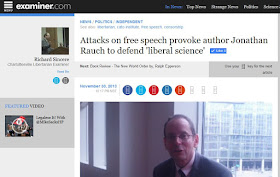November 30, 2013 10:17 PM MST

Jonathan Rauch, the author of Kindly Inquisitors and other books (including Demosclerosis and his 2013 memoir, Denial: My 25 Years without a Soul), spoke recently with the Charlottesville Libertarian Examiner following a panel discussion on freedom of speech at the Cato Institute. He explained what inspired him to write the book in the first place.
When, in the late 1980s, “Salman Rushdie wrote The Satanic Verses and received a fatwa (essentially a death sentence) from Ayatollah Khomeini,” he said, “I thought that the West did not know how to respond to that. It could defend the laws of free speech but it wasn't defending the ideas of free speech. People were saying things like, 'Well, a death sentence on Rushdie is certainly offensive and wrong but Rushdie himself was offensive to Muslims,' and so forth. And I realized that a lot of people didn't understand why we have this idea of letting people say offensive stuff.”
What is 'liberal science'?
One of the concepts Rauch introduces in Kindly Inquisitors is what he calls “liberal science.”
He explained that “most discussions of free thought and speech start and end with the U.S Constitution” but he tries “to go a little deeper and look at society's method for producing knowledge and adjudicating disputes about fact, which is in some ways the most important thing we do” – for instance, disagreements about whether Christianity or Islam is “the right religion.”
Historically, he said, the method of “settling disputes like that was war.”
By contrast, “liberal science substitutes an open-ended, rule-based, social process in which everybody throws out ideas all the time and we subject them to criticism. We kill our hypotheses rather than each other. This turns out both to be spectacularly good at mobilizing intellectual talent to find and promote good ideas and spectacularly good at defusing what otherwise would be political, often violent, conflicts.”
Liberal science, he said, is the term he coined “for the whole intellectual network we have that seeks truth in Western liberal cultures.”
He compares it to two other major social institutions for “allocating resources and adjudicating social conflicts.”
In economics, he said, “market systems are in the business of allocating resources and they use open-ended rules of exchange to do that.”
In politics, he noted, “democracies are in the business of allocating coercive political power and they use the exchange of votes and compromise to do that.”
Parallel to those two systems, he added, “liberal science is in the business of adjudicating questions about who's right and wrong and they use the exchange of criticism.”
These three systems, Rauch explained, “all have in common that it shouldn't matter who you are. Anyone can participate, there's no special authority, and no one gets the final say. No one can stand outside the system and say, 'Here's the final result.'”
The result is “always subject to change. It's a big rolling social consensus.”
Retreat of the ideologues
Since Kindly Inquisitors was first published in 1993, there has been a major, positive change in the intellectual environment, Rauch said.
“In the last twenty years there's been a retreat by active ideologues who favored censorship and speech controls,” he said. Those views have “been replaced with a more refined case that focuses more specifically on how minorities can be hurt when hate speech rises to a certain level of prevalence in society. It's called the 'hostile environment doctrine.'”
In preparing the new edition of his book, Rauch “decided to take a really hard look at that because I think it's right now the biggest and most serious challenge to people like me who advocate very robust freedom of speech.”
He wanted to find out, “from a minority point of view, which is better: a wide open system where people are free to say hateful things about me and often do, or a more controlled system where you've got some people in charge trying to protect me from that?”
His conclusion, “based on the history of the last twenty years for gay rights” is that “there's no contest. We're much better off as minorities when our speech and the other side's speech are [both] protected because we win those arguments, and we're worse off when that process is interfered with.”
The expanded edition of Kindly Inquisitors includes a new foreword by syndicated columnist George F. Will and a new afterword by Jonathan Rauch. It is available now in both Nook and Kindle formats and a print version will be released next year by the University of Chicago Press.
Publisher's note: This article was originally published on Examiner.com on November 30, 2013. The Examiner.com publishing platform was discontinued July 1, 2016, and its web site went dark on or about July 10, 2016. I am republishing this piece in an effort to preserve it and all my other contributions to Examiner.com since April 6, 2010. It is reposted here without most of the internal links that were in the original.

http://keinproblemmm.canalblog.com/
ReplyDelete